Premium Photoshop Editing On Every Scan.
49¢ most slides. Expert Slide and Photo
Scanning Since 2002.
4,000 ppi Extra High Res Scanning.
We can make PRINTS from your Slides.
Personally Processed with care in Wisconsin.
Why Your Slide Scans May Look Out of Focus
(Even When Your Slides Look Good)
The Projection vs. Scanning Difference
You may think your slides look "good" when projected, but scanning reveals the truth: looking at projected slides is completely different from putting them under the microscope of a high-resolution scanner.
When viewing slides projected onto a screen or wall, you're forgiving. The image is blown up, you're looking at one part of a large projection, and you expect it to look a certain way. You might think "maybe it's just me" or "someone should adjust the focus."
But when we scan your slides at 4,000 ppi and you view them on a high-resolution computer monitor, you expect crystal-clear sharpness. You're used to seeing high-resolution digital images. Anything blurry becomes immediately obvious.
The Problem Built Into Slide Design
Unfortunately, most slides—even those taken by professional photographers—have problems built right into their very design that make it difficult to get a perfect scan, even of a slide that was taken in perfect focus.
How Slides Are Made (And Why That Causes Problems)
- Film starts on a roll - Film comes rolled and goes into your camera rolled
- Pictures are taken - While the film is still rolled
- Film is processed - Still rolled
- Film is cut - Individual pictures separated
- Film is mounted - Glued into cardboard or plastic holders
- Now it's a "slide" - Ready for projection
The Critical Issue: If the slide films are not mounted perfectly flat—if the film is warped at all—then you cannot scan the entire image in focus. The scanner can only focus on ONE plane. If the film curves, bows, or warps, parts of it will be out of the focus plane.
When the Original Photo Was Out of Focus
Here we have a scan of a slide that was taken completely out of focus. There is no way we can make this be in focus. It is what it is. We scan what you send us. We can't decide for you that this is not a good picture and you wouldn't want it.
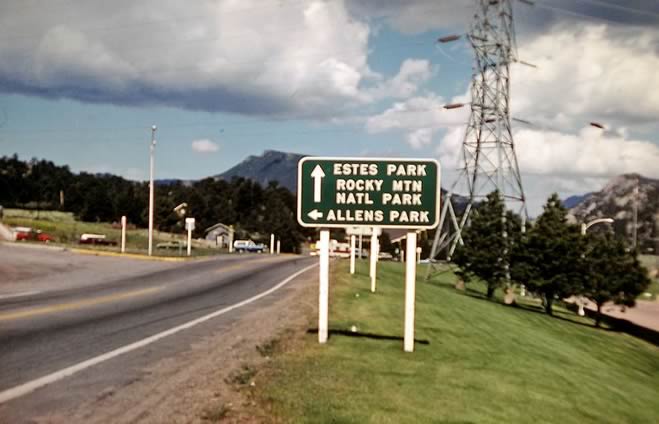
For this customer, there were about 60 of these slides, some even worse, all in a row. We suspect there was a bad roll or two of film or some camera setting that was changed, maybe by accident.
Then, all of a sudden, the slides were in focus. Everything was fine. We didn't do anything different. There is virtually nothing we can do. Our machines are focusing on a piece of film that is fractions of an inch away. We can sometimes change where the particular focus is on that film, but you get back from us what you send us, if not better.
The Same Roll, Slides Suddenly In Focus

Same customer, same scanning session, just a few slides later in the same box. The difference is the original photography, not our scanning.
The "Curved Field" Problem: Why Kodak Made Special Lenses
Important Fact: It is common for slides to have a certain "bow" in the film. Kodak even made a special projection lens called a "Curved Field" lens to compensate for this bow.
Unfortunately, because of this bow, some parts of the film are not going to be in focus when scanned simply because scanners can only focus in ONE place. While your slides may project in focus over most of the slide, it may be because you're using the proper curved field lens on your projector.
Why Film Curves (It's Built In From Manufacturing)
Given the nature of film being curled from the time it's manufactured until it's processed after you took the picture, it has a curl built into it. This curl never completely goes away, even when mounted in a slide holder.
Visual Examples of Film Warpage
Medium Format Film Distortion
You can see the light reflections showing that the film is not flat. It has a bulge in the middle and slopes toward the cardboard edges in both directions.
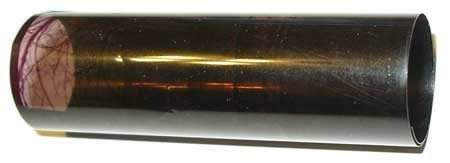
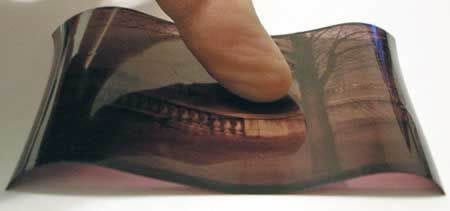
If you have a magnifying glass or loupe and look at any part of this slide film, it may look in focus to you. The problem is that you're focusing your eyes on each particular part of the film as you look at it.
The Only Solution: There is no way to get a scan of this slide with every part in focus unless the film is taken out of the mount and flattened onto a drum scanner. Drum scanning typically costs $25-$50 PER SLIDE. This would be the ONLY way to get a perfect scan in this situation—and that's only IF you're starting with a perfect photo.
Extreme Warpage Examples
Severely Warped Film
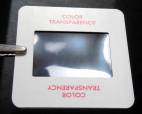
Additional warpage causes: Not only do you have the built-in curl to the film, you also have the film being heated and cooled multiple times in a projector. The glue holding the film in the holder may become unglued. It may even be unevenly unglued, causing the film to be warped in an odd manner.
Extremely Warped 127 Slide
Here is an extreme example of very warped slide film. In this case, the slide holder is not warped—just the film inside. You cannot get a decent scan of this slide. We recommend not sending slides like this for scanning. But we cannot judge that you should not have it scanned if you send it to us. Sometimes it's better to have an out-of-focus scan of Grandma than no scan at all. We can't decide that for you.
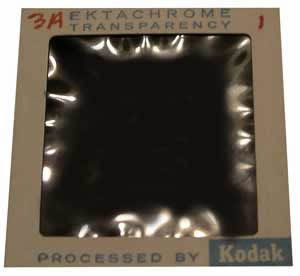
The "One Side In Focus" Problem
Here we have a scan of a warped slide. The left side is in focus while the right side is not. You can only have ONE focus point. We use our own judgment as to where that focus will be.

Our Policy: If you do not agree with our focus choice, we are sorry, but there will be NO re-scans for focus issues. We do the best we can with your slides, but at our low prices, you do not have the luxury of "do-overs."
Showing Warpage with Reflection Grids
These images use reflection grids to show the warpage of the film. If the film were flat, you would see either uniform dark or uniform light overall. The distorted reflections show exactly how warped the film is.
Moderate Warpage
Here is a slide with a reflection grid showing the warpage. This is really not too bad compared to some really bad slides.

Severe Warpage
This is an example of very badly warped slide with the reflection grid pattern showing severe warpage.

Another Angle of Same Slide
You can also see the warpage from this angle. The distorted light and dark reflections show exactly how the film surface curves.
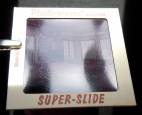
When Both Film AND Holder Are Warped
Then we get to the problem of not just the film being warped but the slide holder itself being warped. This multiplies the film warpage/focus problem.
The "Popping" Problem
There are also slides that "pop" when they are heated up because they've been looked at too long in the past under the high heat of your projector lamp. They have become conditioned by the heat. When cool, they're relaxed; when they heat up, they stretch tight.
If our scan is triggered while the slide is "popping," this could result in a somewhat blurry scan. We can't time the "pop" or know when it will happen. At our low prices, we can't go back and find a slide that may have had this happen and rescan it.
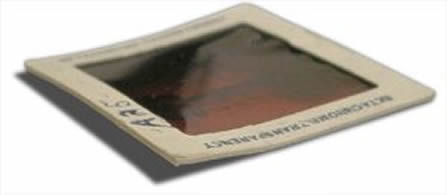
Stack of Warped Slides
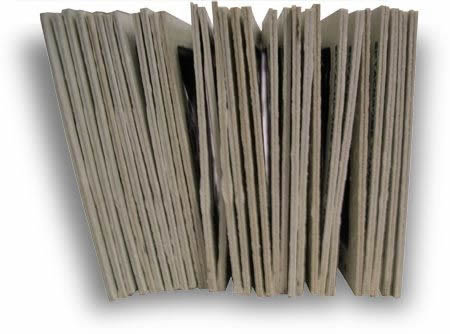
The Original Photography Matters
Focus Placement in the Original Photo
When the picture is taken, there are so many places that focus could have been placed. You're dealing with distances that are feet to miles apart:
- Focus on a person in the foreground → background may be out of focus
- Focus on mountains in the background → people in front may be blurry
- Focus on middle distance → both foreground and background slightly soft
So much depends on:
- The skill of the photographer
- How well they understood their camera
- The film they were using
- The lighting conditions
- The camera settings (aperture, shutter speed)
The Challenge of Film Photography
Imagine what it was like way back when: You had to take a whole roll of film and get it developed before you could see if you had done anything wrong when taking pictures. Think about being on a trip and taking many rolls before getting the film developed, only to discover your settings didn't work as expected.
Many people did not take really good slide photos. That's just the reality. We see it every single day in thousands of slides. It wasn't the equipment's fault or the processing lab's fault—it was the challenge of manual focus cameras and the learning curve of film photography.
Our Commitment to You
Be assured that we are going to try to give you the best scans we can, given what we have to deal with.
It would not be to our advantage to not tediously try to make sure your scans are in focus as much as possible. That is what we do. We work on your project just as though it was our own project.
We work with what you send us, but we only do "Magic," not "Miracles."
What We Can Control
- Professional Photoshop editing on every scan
- Careful focus placement decisions on warped slides
- 4,000 ppi high-resolution scanning
- Color correction and exposure optimization
- Dust and scratch removal
- Personal attention to every single slide
What We Cannot Control
- The original photography quality
- Film warpage from age and heat exposure
- Warped slide holders
- Physics—we can only focus on one plane at a time
- Original focus placement by the photographer
Try Our Service Risk-Free
We understand these technical limitations can be concerning. That's why we offer 10 free demo scans so you can see exactly what to expect from your specific slides before committing to scanning your entire collection.
This lets you:
- See how your slides actually scan (versus how they project)
- Understand the focus limitations based on your specific slides' condition
- Evaluate our professional Photoshop editing quality
- Make an informed decision about proceeding
- Identify which slides are worth scanning and which aren't
Questions About Focus Issues?
We're happy to discuss any concerns about your specific slides. Contact us and we'll give you honest advice about what to expect based on your slides' condition.
Remember: Every scan receives professional Photoshop editing, and we work to get the best possible result from every slide you send us. While we can't overcome the physics of film warpage, we can ensure you get the highest quality scan possible given the condition of your original slides.

 Home
Home Order Forms
Order Forms